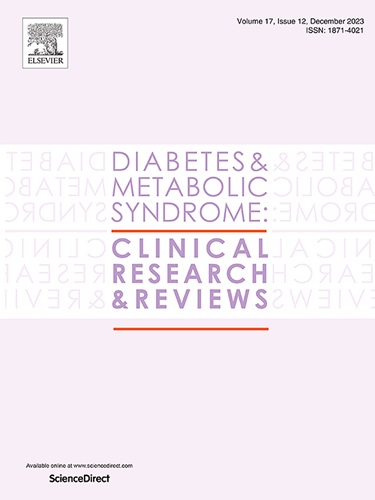妊娠糖尿病--接受胰岛素或饮食治疗的妇女的新生儿和产妇结局:倾向匹配分析
IF 4.3
Q1 ENDOCRINOLOGY & METABOLISM
Diabetes & Metabolic Syndrome-Clinical Research & Reviews
Pub Date : 2024-10-01
DOI:10.1016/j.dsx.2024.103145
引用次数: 0
摘要
目的:全世界的孕妇都面临着罹患妊娠糖尿病(GDM)的风险,如果不及时治疗,会引发并发症。本研究探讨了影响妊娠糖尿病孕妇在饮食控制和胰岛素治疗之间做出选择的因素。研究旨在了解这些选择如何影响孕产妇和新生儿的预后:在这项准实验研究中,2010 年至 2020 年,临床医生根据基线特征为一家私人诊所的 1030 名 GDM 患者确定了治疗方法(饮食控制或胰岛素)。通过多元逻辑回归得出了反映治疗分配概率的倾向分数(PS):经过倾向评分匹配,386 人从两个研究组中配对。胰岛素治疗组发生新生儿低血糖的风险是饮食治疗组的 4.43 倍。按PS分层的胰岛素治疗个体显示,与低风险四分位数相比,高风险四分位数的平均胰岛素需求量明显更高,足月时的胰岛素剂量也增加了一倍。前三个四分位数的胰岛素平均剂量没有显著差异,但最后一个四分位数的胰岛素平均剂量显著增加(p = 0.008),尤其是 PS 超过 0.70 的个体,这表明有效控制血糖需要更高的胰岛素剂量:本研究表明,有不良产科病史、糖尿病家族史、肥胖和基线血糖参数升高的人需要更高的胰岛素剂量。这一见解有助于临床医生在诊断和治疗计划中做出决策,提高医疗实践的精确性。本文章由计算机程序翻译,如有差异,请以英文原文为准。
Gestational diabetes mellitus - Neonatal and maternal outcomes in women treated with insulin or diet: A propensity matched analysis
Aims
Pregnant women worldwide face the risk of developing gestational diabetes mellitus (GDM), if left untreated, can cause complications. The study explores factors influencing the choice between diet control and insulin therapy for pregnant women with GDM. It aims to understand how these choices impact maternal and neonatal outcomes.
Methods
In this quasi-experimental study, clinicians determined treatment (diet control or insulin) for 1030 individuals with GDM at a private practice from 2010 to 2020 based on baseline characteristics. Propensity scores (PS), reflecting the probability of treatment allocation, were derived through multiple logistic regression.
Results
After PS matching, 386 individuals were paired from two study groups. The insulin-treated group exhibited a 4.43 times higher risk of neonatal hypoglycemia than the diet group. Insulin-treated individuals, stratified by PS, revealed that the high-risk quartile had significantly higher mean insulin requirements and a doubled dose at full term compared to the lower-risk quartiles. The mean insulin dose did not significantly differ in the first three quartiles, but the last quartile showed a significant increase (p = 0.008), particularly for individuals with PS exceeding 0.70, indicating a higher insulin dose requirement for effective glucose control.
Conclusion
This study reveals that individuals with a bad obstetrics history, a family history of diabetes, obesity, and elevated baseline glycemic parameters necessitate higher insulin doses. This insight improves clinicians' decision-making in diagnosis and treatment planning, enhancing the precision of medical practices.
求助全文
通过发布文献求助,成功后即可免费获取论文全文。
去求助
来源期刊

Diabetes & Metabolic Syndrome-Clinical Research & Reviews
ENDOCRINOLOGY & METABOLISM-
CiteScore
22.90
自引率
2.00%
发文量
248
审稿时长
51 days
期刊介绍:
Diabetes and Metabolic Syndrome: Clinical Research and Reviews is the official journal of DiabetesIndia. It aims to provide a global platform for healthcare professionals, diabetes educators, and other stakeholders to submit their research on diabetes care.
Types of Publications:
Diabetes and Metabolic Syndrome: Clinical Research and Reviews publishes peer-reviewed original articles, reviews, short communications, case reports, letters to the Editor, and expert comments. Reviews and mini-reviews are particularly welcomed for areas within endocrinology undergoing rapid changes.
 求助内容:
求助内容: 应助结果提醒方式:
应助结果提醒方式:


